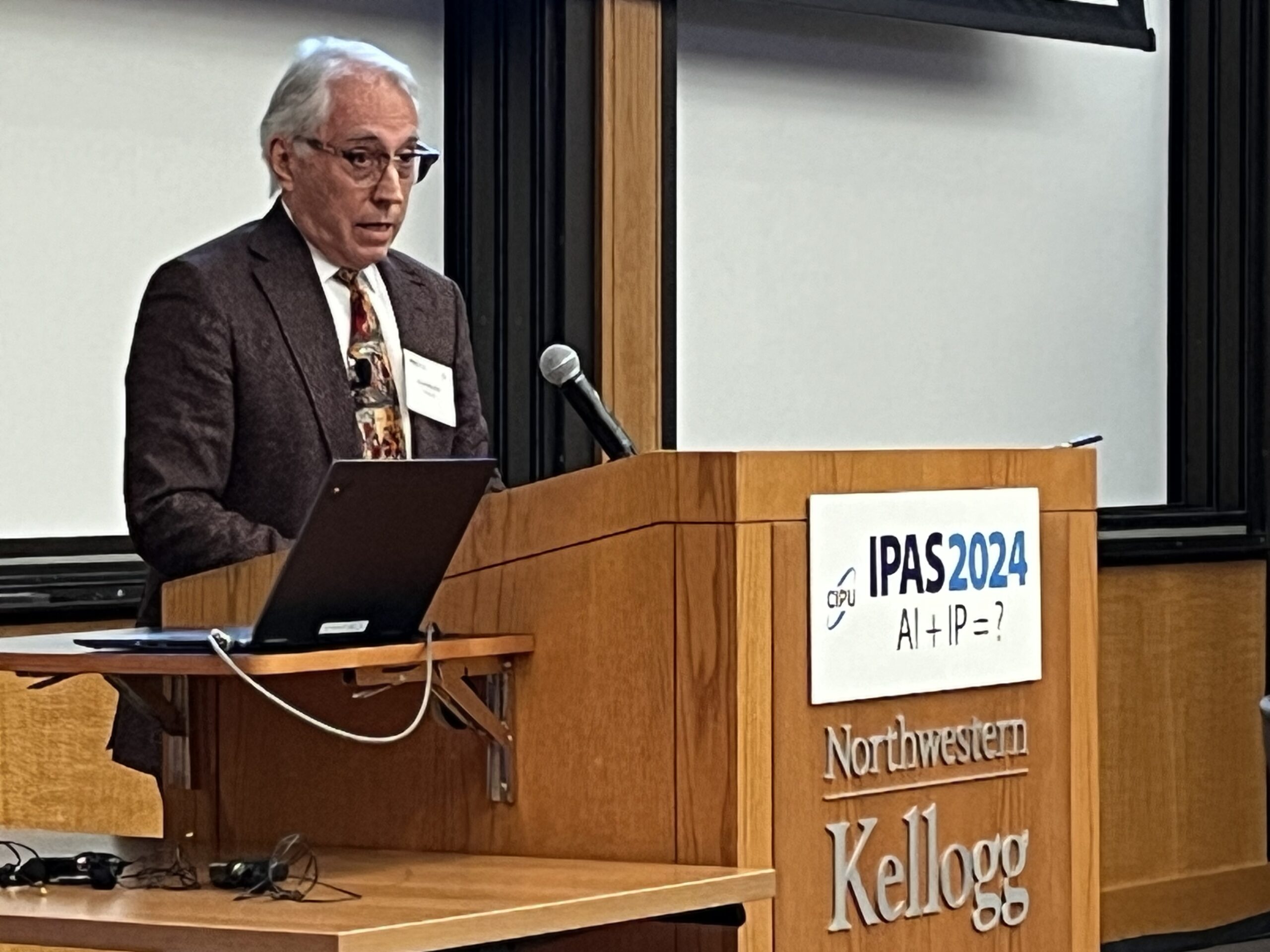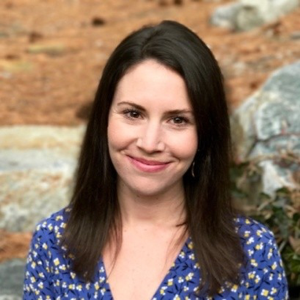“After meeting with patent examiners to explain the science underpinning what would become the world’s first and only fully-automated AI-driven platform to detect cervical cancer, we began to overcome office actions being issued to deny our patents.”- Dr. Alan Nelson
“It’s not true that if you build a better mouse-trap, the world will beat a path to your door. The world’s going to fight like hell to keep things just the way they are.”
— Dr. Gary Michelson, spinal surgeon, inventor (900+ patents) and philanthropist.

Dr. Alan Nelson Photo credit: CIPU
The remarkable story that inventor Alan Nelson shared last week at the 7th Annual Intellectual Property Awareness Summit held by CIPU at Northwestern University was revealing in many ways.
Dr. Nelson related how he overcame numerous obstacles to commercialize a landmark technology for detecting cervical cancer in the 1990s. Using artificial intelligence (AI) while at the University of Washington, Dr. Nelson automated and vastly improved how early and accurately cervical cancer is identified — he and his team invented a machine to read Pap smears.
There was no question that his invention would save lives: The prevalence of false negatives was a known and ongoing challenge for doctors. False negatives are diagnostic reports of normal when, in fact, cancer is present. So, did the medical establishment open its arms to Dr. Nelson? Not exactly.
First, he had to overcome rejections at the U.S. Patent and Trademark Office (USPTO) – rejections that are largely due to a lack of examiner exposure in the art. During his keynote presentation, and in a statement he made earlier during the day, Dr. Nelson stressed the necessity of reaching out to open and sustain a dialogue with the USPTO when you’ve invented a very new, poorly understood technology. Education goes a long way to improve the accuracy of patent claims and the USPTO is receptive to this.
“After meeting with patent examiners to explain the science underpinning what would become the world’s first and only fully-automated AI-driven platform to detect cervical cancer, we began to overcome office actions being issued to deny our patents,” said Dr. Nelson,

Photo credit: CIPU
But when Dr. Nelson went to the Food and Drug Administration (FDA) to present compelling clinical trial data, showing that the Pap smear screening machine would dramatically reduce the false negative rate of pathologists, he confronted a picket line outside the FDA where pathologists held signs saying they did not want a machine to take their jobs. The FDA advisory panel was comprised of pathologists who voted against approval. His AI invention was better at analyzing pap smear slides to detect evidence of early cervical cancer than current physician practice.
“The FDA was acting conservatively and had never before seen a technology that vastly exceeded the accuracy of the medical gold standard, using automated 2D cell imaging, machine learning and AI,” he explained.
Undeterred, he approached Patty Murray, a member of Congress from his home state, Washington, to share how his invention would result in fewer women suffering as a result of false negatives. Along with some of her colleagues, she lobbied the FDA on his behalf, explaining that Congress would be concerned if this breakthrough technology was denied FDA approval for any reason other than science. The FDA quickly reversed course, making Dr. Nelson’s technology the first FDA-approved AI-driven diagnostic device for cancer.
After a successful IPO in 1996, Dr. Nelson sold his company — along with the intellectual property he had obtained along the way — to Becton Dickinson. Becton Dickson globalized the technology, including to countries that historically did not offer Pap smear screening for lack of trained pathologists. Now the machine could do it.
He wanted to keep innovating to save lives; this time, by improving how lung cancer is detected. Unwilling to create even an appearance of infringement on the patent portfolio he had sold, he told the audience, he set out to invent and develop a new way of detecting early evidence of lung cancer using AI and 3D cell imaging. Today, as founder, chairman, and CEO of VisionGate, his company does exactly that.
Other Notable Panels

Photo credit: CIPU
Other highlights of IPAS 2024 include a keynote by Alex Castrounis, a data scientist, former IndyCar racing engineer and now CEO of Why of AI who spoke about the need to harvest and analyze masses of data quickly for competitive advantage.
Scott Kieff, former Commissioner of the ITC led an opening panel, “Slow, regulate or leave it alone,” in which he was joined by Jerry Ma, the USPTO’s Director of Emerging Technologies, Daniel Papst of Papst Licensing GmbH & Co KG, and AI, healthcare and cybersecurity investor Armando Pauker. Armando stressed that the value of AI startups is in the data, and more specifically, how the company solves a problem using that data.
Another memorable panel was moderated by Adam Mossoff, George Mason Law Professor, innovation policy expert and CIPU board member. Adam posed the question of “What is good IP behavior?” to panelists including Albhy Galuten, the Grammy award-winning producer, inventor and futurist who has worked with everyone from the Bee Gees to Aretha Franklin and Eric Clapton.
The takeaway: AI offers us the opportunity to redefine and reembrace what it means to be human, he said.
IP Leadership
There are many valuable lessons to take away from Dr. Nelson’s story for all of us. Dennis Daniels, the vice-president of Chicago Inventors Organization and an IPAS panelist, spoke for the in-person audience and livestream attendees from around the world when he wrote, “Alan Nelson’s keynote presentation was one that made me want to jump out of my seat and pump my fist! 360-degree slam dunk, game over!”
Dr. Nelson’s grit and tenacity made me think of the Theodore Roosevelt quote about who deserves our attention:
“It is not the critic who counts; not the man who points out how the strong man stumbles, or where the doer of deeds could have done them better.
The credit belongs to the man who is actually in the arena, whose face is marred by dust and sweat and blood; who strives valiantly; who errs, who comes short again and again, because there is no effort without error and shortcoming; but who does actually strive to do the deeds; who knows great enthusiasms, the great devotions; who spends himself in a worthy cause; who at the best knows in the end the triumph of high achievement, and who at the worst, if he fails, at least fails while daring greatly, so that his place shall never be with those cold and timid souls who neither know victory nor defeat.”
Even within the innovation ecosystem, women and men with unique vision are overlooked. The reality is that offering even slightly disruptive solutions or improvements inspires fear.

Photo credit: CIPU
Notably, the 2024 edition of the IP Awareness Summit was held in partnership with Northwestern University’s Segal Design Institute, McCormick School of Engineering and Kellogg School of Management, led by James Conley (a National Academy of Inventors Fellow and professor at Kellogg) and Dan Brown (also an NAI fellow, an inventor-entrepreneur and a professor at Segal). The participation of many curious undergraduate and graduate students was invigorating. “My mind was blown,” recounted one.
I have interviewed hundreds of inventors over the past 15 years. A common thread is the willingness to go where others have not and the doggedness to see their vision through in the face of ample doubt, fear, and personal sacrifice. Creators of all types, including musicians and visual artists, need to know their success will be recognized and feel their failures have meaning.
Investors, educators, students, and the general public are all stakeholders in the innovation ecosystem. When they are better informed about the creative process and the needs of creators, they can better help an often mysterious and arduous process generate benefits for all.
In 2015, Alan Nelson was named a National Academy of Inventors Fellow. He has 139 issued patents.

![[IPWatchdog Logo]](https://ipwatchdog.com/wp-content/themes/IPWatchdog%20-%202023/assets/images/temp/logo-small@2x.png)

![[Advertisement]](https://ipwatchdog.com/wp-content/uploads/2024/04/UnitedLex-May-2-2024-sidebar-700x500-1.jpg)
![[Advertisement]](https://ipwatchdog.com/wp-content/uploads/2024/04/Patent-Litigation-Masters-2024-sidebar-700x500-1.jpg)

![[Advertisement]](https://ipwatchdog.com/wp-content/uploads/2021/12/WEBINAR-336-x-280-px.png)
![[Advertisement]](https://ipwatchdog.com/wp-content/uploads/2021/12/2021-Patent-Practice-on-Demand-recorded-Feb-2021-336-x-280.jpg)
![[Advertisement]](https://ipwatchdog.com/wp-content/uploads/2021/12/Ad-4-The-Invent-Patent-System™.png)






Join the Discussion
2 comments so far. Add my comment.
Mickie Piatt
April 5, 2024 10:41 amThis was an excellent and accurate review of an outstanding conference that featured a wide variety of innovators and creators. Thank you for the report.
Anon
April 4, 2024 07:11 pmBest be careful bantering about that buzz word of AI.
Add Comment